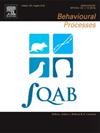简短的固定间隔干预可促进大鼠的自控能力
IF 1.3
4区 生物学
Q4 BEHAVIORAL SCIENCES
引用次数: 0
摘要
冲动性选择是指大鼠选择较小的较快奖励而不是较大的较迟奖励,可以通过让大鼠接触延迟奖励的时间干预来减少冲动性选择。这些干预措施可以改善时间处理,同时减少冲动性选择。经过 30 个疗程的干预后,大鼠的自我控制能力得到了改善(Renda 等人,2021 年)。本研究的实验 1 采用前/后测试设计,调查了一系列干预暴露(6、15、30 和 45 个疗程),包括以前未曾研究过的较短暴露。此外,还对峰值间隔时间进行了评估,以确定不同的干预暴露是否会改善时间处理。包括简短干预在内的所有干预都减少了冲动选择,改善了时间处理。实验 2 显示,相对于无延迟对照组,6 个疗程的干预提高了自我控制能力,进一步加强了简短干预足以减少冲动选择的建议。此外,在接受干预前冲动性选择评估的组别中,峰值间隔时间也有所改善,这表明接受冲动性选择任务可能会改善时间处理能力。本文章由计算机程序翻译,如有差异,请以英文原文为准。
Abbreviated fixed-interval interventions promote self-control in rats
Impulsive choice, defined as choices of a smaller-sooner reward over a larger-later reward, can be reduced by time-based interventions that expose rats to delayed rewards. These interventions improve temporal processing concurrent with reducing impulsive choice. Exposure to delayed reinforcement has produced improvements in self-control after 30 sessions of intervention exposure (Renda et al., 2021). Experiment 1 of the present study used a pre-/post-test design to investigate a range of intervention exposures (6, 15, 30, and 45 sessions), including shorter exposures that have not previously been examined. Peak-interval timing was also assessed to determine whether different intervention exposures would improve temporal processing. All intervention exposures, including the abbreviated intervention, reduced impulsive choice, and improved temporal processing. Experiment 2 showed that the 6-session intervention improved self-control relative to a no-delay control, further strengthening the proposal that an abbreviated intervention may be sufficient to reduce impulsive choice. Moreover, improvements in peak-interval timing were observed in groups receiving a pre-intervention impulsive choice assessment, suggesting that exposure to the impulsive choice task may improve temporal processing.
求助全文
通过发布文献求助,成功后即可免费获取论文全文。
去求助
来源期刊

Behavioural Processes
生物-动物学
CiteScore
2.70
自引率
7.70%
发文量
144
审稿时长
4-8 weeks
期刊介绍:
Behavioural Processes is dedicated to the publication of high-quality original research on animal behaviour from any theoretical perspective. It welcomes contributions that consider animal behaviour from behavioural analytic, cognitive, ethological, ecological and evolutionary points of view. This list is not intended to be exhaustive, and papers that integrate theory and methodology across disciplines are particularly welcome.
 求助内容:
求助内容: 应助结果提醒方式:
应助结果提醒方式:


